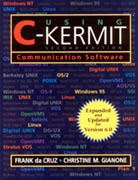|
New York City USA
•
kermit@kermitproject.org
…since
1981
|
| Home | C-Kermit | E-Kermit | Kermit 95 | Scripts | Timeline | About | Archive |

| ▶ ▶ Next
release: C-Kermit 10.0 Beta.12
(22 March 2025) For Unix (Linux, macOS, NetBSD, FreeBSD, Android, HP-UX, MINIX, etc), VMS, and (for the first time in 20 years) Microsoft Windows (next item). Testers welcome! | |||||||||
|
|

|
|
And lots more -- CLICK HERE for specifications.
C-Kermit 9.0 is available for practically every known variation and version of UNIX, past and present (such as Linux, Android, Mac OS X, FreeBSD, NetBSD, OpenBSD, AIX, Solaris, HP-UX, etc), on every 32- or 64-bit architecture, and for DEC / Compaq / HP VMS / OpenVMS on VAX, Alpha, and IA64 / IPF. Earlier releases of C-Kermit remain available for other platforms and operating systems:
In Unix, C-Kermit can be thought of as a user-friendly and powerful alternative to cu, tip, minicom, uucp, ftp, ftpd, telnet, ktelnet, rlogin, ssh, find, grep, iconv, recode, expect, wget, sendpage, bc, and to some extent even Lisp, your shell, and/or Perl; a single package for both network and serial communications, offering automation, helpfulness, and language features not found in most of the other packages, and with most of the same features available on all its non-Unix platforms (such as VMS), as well as in Kermit 95 on Windows 95/98/ME/NT/2000/XP/Vista/7/8/10. CLICK HERE for a general discussion of C-Kermit package making. Note also that the Unix version of C-Kermit includes its own installation procedure, built into the makefile. See Section 5 of the Unix C-Kermit installation guide. -->
As of version 9.0, C-Kermit has an Open Source license, the Revised 3-Clause BSD License. Everybody can use it as they wish for any purpose, including redistribution and resale. It may be included with any operating system where it works or can be made to work, including both free and commercial versions of Unix and OpenVMS.
C-Kermit 8.0 and 7.0 had a more restrictive license, CLICK HERE to see it.
[ Top ] [ Download ] [ Binaries ] [ Kermit Home ]
|
The user manual for C-Kermit is (still) the book Using
C-Kermit, Second Edition
[ INFO ], which is current with
C-Kermit 6.0. Features new in subsequent C-Kermit releases are documented
in the supplements (see links just below).
The manual explains step-by-step, with examples and sometimes pictures, how to use C-Kermit: how to make connections, how to troubleshoot connection and file-transfer problems, how to handle character-set translation, how to write script programs, and lots more; especially useful since live Kermit software support is no longer available from Columbia University after 30 June 2011. Beginning in 2011, the manual is also available from Amazon.com as a Kindle E-Book.
As of February 2016 Using C-Kermit
can also be downloaded for free as
a PDF file; CLICK HERE for details.
|
Online Information Resources:
[ Top ] [ Kermit Home ]
The current C-Kermit release is 9.0.302 of 20 August 2011. Much work has been done on C-Kermit since then; the results are HERE (see change log). The current test version needs to be turned into a formal release primarily in order for C-Kermit to work with new releases Glibc.You have many choices for downloading:
[ Top ] [ Kermit Home ]
If you have your own desktop Unix/Linux system such as Ubuntu or Debian, you can probably install C-Kermit on it by simply giving a command like "sudo apt install ckermit" (Ubuntu example), in which case you can skip the rest of this page.
You can download C-Kermit 9.0 source and text files directly from the Kermit Project in any of several archive formats by clicking on the following FTP links. The complete archives contain source code, build procedure, license, initialization files, CA certificates, manual page or help topic, initialization files, and plain-text information files extracted from the Web pages listed in the Documentation section: a complete distribution. The text archives contain everything but the source code; these can used when you download a prebuilt binary. The size of each archive file in megabytes is shown in each cell. NOTE: "Unix" refers to the entire Unix operating system family: Linux, Mac OS X, Android, AIX, Solaris, etc etc.
DOWNLOAD:
| Archive | Zip | Tar | Tar.Z | Tar.gz |
|---|---|---|---|---|
| Unix Complete | 2.9 | 11.7 | 4.1 | 2.9 |
| Unix Text Only | 0.8 | 2.7 | 1.0 | 0.8 |
| VMS Complete | 2.8 | |||
| VMS Text Only | 0.6 |
(Zip archives contain only text files, unzip them with "-a" or "-aa".)
Besides those, we also have C-Kermit 7.0 archives for the following platforms that have not been updated since then:
If you want to monitor developments in C-Kermit since the most recent release, you can find the current working source code HERE.
Source code and text files are also available separately in the
[ Top ] [ Hints & Tips ] [ Kermit Home ]
$ mkdir kermit $ cd kermit
$ gunzip cku302.tar.gz $ uncompress cku302.tar.Z
$ tar xvf cku302.tar
If you downloaded a Zip archive, unzip it. Example:
$ unzip -a cku302.zip
$ rm cku302.tar (or rm cku302.zip)
$ make linux (Linux, almost any version) $ make macosx (Mac OS X, 2001-2019) $ make macos (MacOS, 2020 and later) $ make freebsd (FreeBSD, any version) $ make openbsd (OpenBSD, any version) $ make netbsd (NetBSD, any version) $ make aix (IBM AIX) $ make aixg (IBM AIX with gcc) $ make solaris10 (Sun Solaris 10 with cc) $ make solaris10g (Sun Solaris 10 with gcc) $ make irix63 (SGI IRIX 6.3)
~/bin, optionally
renaming it to "kermit" or "ckermit" or whatever else you want and give it
permissions of 700, 750, or 755, as appropriate. Otherwise...
[ Top ] [ Hints & Tips ] [ Kermit Home ]
If you want to install a prebuilt VMS binary, then fetch the most appropriate VMS binary from the C-Kermit binaries table. Pick a VAX binary for a VAX or an Alpha binary for an Alpha. The VMS version number for the binary must be less than or equal to your VMS version. If you want to make TCP/IP connections, pick the binary for the appropriate TCP/IP product (TGV Multinet, DEC UCX, Process Software TCPware, etc), again with a version number less than or equal to yours; if none can be found, then try a UCX version (since most non-DEC TCP products include built-in UCX emulation). If you downloaded a prebuilt binary, also download the VMS C-Kermit text-file archive. Then read the installation instructions for VMS.
If you want to build from source code, fetch the VMS complete archive
above if you have VMS-based unpacking tools,
otherwise get the source files and text individually as described just below.
NOTE: Unzip the Zip file with "
$ create/directory kermit $ set default [.kermit]
$ unzip -a ckv302.zip
$ @ckvker
If you have a pre-5.0 VMS release, use the "old" build procedure:
$ @ckvold
If you experience any trouble, read the comments at the top of the build procedure.
$ r wermit
[ Top ] [ Hints & Tips ] [ Kermit Home ]
The C-Kermit binaries archive is at Columbia University. It was frozen on July 1, 2011. Due to space and bandwidth limitations, it could not be moved to the new kermitproject.org site. Before visiting the table, you should read this section.
When you download a prebuilt-Kermit binary, you should also download the C-Kermit text files, unpack them if necessary, and install them as desired. NOTE: In Unix, you can still use "make install", even if if you did not use the makefile to build your Kermit binary (the makefile as well as all the text files you need are in the text archive).
In the binaries table, filenames start with "ck" for C-Kermit, then one letter or digit to indicate the platform ("u" for Unix, "d" for Data General AOS/VS, "v" for VMS, "i" for Amiga, "9" OS-9, "p" for Plan 9, etc). After that comes a three-digit edit number:
188: VersionThen a possible test-version designator: "a" for Alpha or "b" for Beta, followed by the 2-digit test number. Examples:5A(188) , November 1992 through September 1993.
189: Version5A(189) , September 1993 through October 1994.
190: Version5A(190) , October 1994 through September 1996.
192: Version6.0.192 , September 1996 through December 1999.
193: Version6.1.193 , November 1996 through June 1998.
194: Version6.1.194 , June 1998 through December 1998.
195: Version7.0.195 , January 1999 through August 1999.
196: Version7.0.196 , September 1999 through final release 1 Jan 2000.
197: Version7.0.197 , January-February 2000.
200: Version8.0.200 , December 2001.
201: Version8.0.201 , February 2002.
206: Version8.0.206 , October 2002.
208: Version8.0.208 , 14 March 2003.
209: Version8.0.209 , 17 March 2003.
211: Version8.0.211 , 10 April 2004.
300: Version9.0.300 , 30 June 2011.
301: Version9.0.301 , 11 July 2011.
302: Version9.0.302 , 20 August 2011.
cku209.xxx C-Kermit 8.0.209 final release cku200b04.xxx C-Kermit 8.0.200 Beta.04 cku197.xxx C-Kermit 7.0.197 final release
Test versions are included here only for platforms that do not have a final build available (usually because the machine disappeared or had an OS upgrade before the final C-Kermit release). CLICK HERE to see the current C-Kermit development release (if any).
Note that edits 193, 194, 195, 198, 199, 202-05, and 212-299 were never formally released (191 was only for OS/2).
The rest of the name is platform-dependent; in Unix it's the name of the makefile target, optionally followed by specific hardware platform and/or OS version, when it makes a difference. In VMS it's the platform ("axp" (i.e. Alpha) or "vax"), then the VMS version number (e.g. "vms73"), and then TCP/IP product and version number (or "nonet" if TCP/IP support is not built in). And so on. VMS TCP/IP product codes are as follows:
REMEMBER: It's often better to build your own binary than to run a prebuilt one, due to the ever-increasing likelihood of OS and/or library version mismatch.
After downloading, rename to "
$ mv cku302.linux-i386-rhel5 kermit $ chmod +x kermit
Also remember that before C-Kermit can be used to dial out from Unix, it will probably also be necessary to give the Kermit executable a certain owner and group, and to set it suid and/or sgid bits, to allow it access to the dialout device and/or lockfile directory (the same as any other dialout software, such as cu or minicom). Read Sections 10 and 11 of the Unix C-Kermit installation guide.
Notes on the Binaries:
CLICK HERE to visit the C-Kermit binaries table.
KERMIT PROTOCOL : SECURE : SCRIPTABLE : TELNET : UNIX : VMS : LINUX : BSD : MAC OS X : SOLARIS : AIX : HP-UX : TRU64 : SCO : QNX : IRIX : UNICODE : KERBEROS : SSL : TLS : SRP : FTP SCRIPT : FILE TRANSFER : MODEM : DIAL : PAGER
[ Top ] [ Kermit Home ]
| Language | Link | Date | Translator | Organization |
|---|---|---|---|---|
| Belarusian | Беларуская | 2023/08/22 | Vladyslav Byshuk | Владислав Бишук | studycrumb.com |
| French | Français | 2023/08/31 | Kerstin Schmidt | Admission-Writer |
| German | Deutsch | 2023/08/31 | Kerstin Schmidt | Pro-Academic-Writers |
| Russian | Русский | 2023/08/22 | Vladyslav Byshuk | Владислав Бишук | skyclinic.ua |
| Spanish | Español | 2023/08/31 | Kerstin Schmidt | WriteMyEssay4Me |
| Ukrainian | Українська | 2023/08/22 | Vladyslav Byshuk | Владислав Бишук | studybounty.com |
| The New Open-Source Kermit Project hosted by Panix.com / Created: 1 July 2011 / Most recent update: 8 September 2023 |